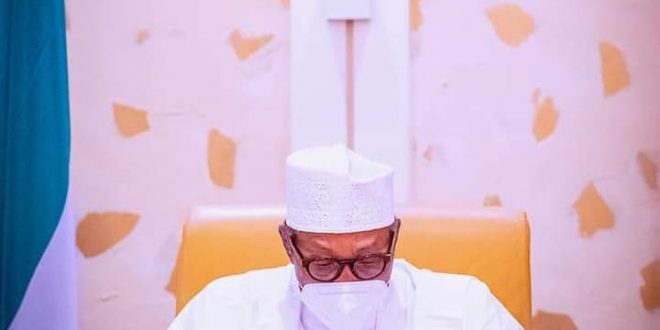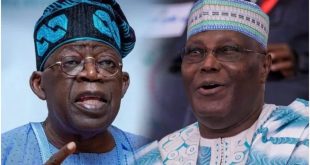By Lateef Adewole
It was ecstatic in a way, the reactions of Nigerians to the media appearance of President Buhari last week, starting from Thursday to Saturday. It was like a situation where people finally saw a “masquerade” they long awaited. And the president did not disappoint as might have been the expectations of many Nigerians, given the sloppiness with which such engagements sometimes appearred in the past.
Within a spate of forty eight hours, the amount of media engagements by the president, the content of the engagements and their far-reaching effects, were far more than in many years of the administration put together. The Arise Media crew blazed the trail when their exclusive interview hit the airwaves on their premium programme, The Morning Show.
The top quality of the members of the interviewees must have added so much credence and verve to it. Had it been one of the government-owned media houses, many might not have taken it that serious. That was why many saw the interview conducted the following day by the Nigerian Televison Authority (NTA) as superfluous. The previous day’s interview on the Arise Tv already stole the show. That NTA’s was unnecessary. A mere waste of time, money and energy, with all due respect.
The rigorous interview, aired on Thursday, was recorded previous day, which was a little blight on it. Many believe it was so done due the concerns of the president’s handlers about his capacity to handle live interview without any faux pas. So, any such misstep would have been corrected in a pre-recorded one. I don’t know if such was the case here too.
On that very Thursday, President Buhari was in Lagos to commission the railway station and some security equipment of NIMASA. That afforded him another chance to speak to the citizens. Then the Friday interview on NTA. By Saturday, a national broadcast from the president, in the commemoration of the Nigeria Democracy Day on June 12, was also aired. So, there were four consecutive media appearances by the president in about forty eight hours. That was unprecedented, given it was not a campaign period.
Truly speaking, had the president took time to do this regularly, all the myth around him, the misinformations, confusion and despair that his aloofness always created would not have happened. Or at least, would be minimal. On all these occasions, he took time to address many pressing national issues, particularly in the Arise interview. That has generated quantum of mixed reactions since then, with people viewing it from different perspectives.
I initially did not have any intention of writing about them but for the persistent “hounding” by a good friend, a “Buharist”, who would not let anything about the president or his administration slide without “calling me out” (lol). For that, I had to go back and watch the interview all over again.
Before going into some specifics, my general overview is that, the president displayed a good grip on many issues facing the country. Also, he was very frank, with little or no diplomacy to mask his mindset or feelings. Although, there were many direct questions which the president was evasive in his responses or used subtituted answers. There were few instances of answers unrelated to the questions too. In the overall, at least, we heard directly from the horse’s mouth and we now know exactly what the thinking of the president is.
I will give my opinions on many of the controversial points made by the president in the interview. For the president to score himself well on security is incorrect. Basing such performance on a “supposed” improvement in the fight against bokoharam in the North-East is insufficient. Granted that there were bombs going off in many parts of the north and Abuja before his coming, which have drastically reduced. However, even at the height of that, many of us living and working in the north then, could still travel freely to most parts. Unfortunately, that’s nearly impossible now except someone is on a suicide mission. Right now, the whole country is unsafe, largely from the activities of bandits, kidnappers, unknown gunmen and separatists, not just the bokoharam in the North-East. By the way, ISWAP has joined bokoharam in that region and we saw how the governor of Borno state lamented many times about incessant attacks. So, who briefed President Buhari about any improved security?
The IPOB was a non-issue before this administration. However, we have seen the havocs being wrecked directly or indirectly in the South-East due to their mishandling by the Federal Government. The president must have been mixing things up or was it deliberate, when he said in one breathe, that IPOB is like a dot in a circle and then said they have businesses and properties all over the country? That even if they want exit, there is no wayout for them. This is contrary to the interpretation given to “dealing with them in the language they understand”, which his supporters said he didn’t mean the whole Igbos but criminals. How is that?
One sore point in the interview was the president’s position on the ban on open grazing. It was saddening. Many Nigerians have now seen where the herders derived their audacity from, to run over the whole place. They have a sense of entitlement, as reiterated by the president while responding to the proclamation by the whole seventeen elected governors of the south. President Buhari wouldn’t even look at the merit in their argument but simply went with an advice he got from his appointee (not elected), the AGF, which happened to be wrong also. He referenced a “non-existing” gazette on cattle routes and grazing area at independence, in the early 60’s. He was misadvised, either out of mischief or ignorance of such adviser.
Closest to this in any record, not national constitution, were the ones practised in the then Northern region, under Sir Ahmadu Bello. That was a northern agenda largely. It’s surprising that a president, who himself a herder, who ranched his cows, would be comfortable to support open grazing that has been at the root of the most insecurities, killings and kidnappings across Nigeria. To what end? Even if the president loves his Fulani heritage and people that much, was it for them to continue to suffer, wandering in forests, trekking hundreds and thousand of kilometres with their cows, in the name of one retrogressive and archaic culture and way of rearing cattles? That is not love to me. Surely, the president would never agree that his own children or immediate family do such thing. They are well-educated and live in opulence. Why will the president wished otherwise for his fellow Fulanis?
It’s interesting that when it comes to “cows and their well-being”, the president was quick to remember and fall back to the first republic for solutions. However, when people demanded for restructuring, he feigns ignorance of what that means. When people cited going back to the regional government from independence up to 1966 and adopting the 1963 republican constitution, the president was usually promp in pushing the bulk to the national assembly as the only avenue through which citizens can vent their views, knowing that hardly leads to anywhere. How conveniently contradictory?
When the concern was raised about the unprecedented mammoth debts that the current administration has acquired, with the attendant consequences of using all revenues to service debt, and little or nothing left for infrastructures, the president fell back to the usual “blame game”. He retorted why didn’t they ask the past governments where all the money they made during the oil boom were? This is very valid. But, it was their profligacy that made Nigerians to send them packing. So, that should be no excuse to do the country in through humongous debts.
Although, the president quoted some wrong figures when he said the crude oil production from 1999 to 2014 was 2.1 million barrels per day and oil sold at over 100 dollars per barrel during this period. That was incorrect. In fact, the only period when such price happened was in 2008 and between 2011 and 2014. The annual average price of crude oil in 1999 ($19.35), 2000 ($30.38), 2001 ($25.98), 2002 ($26.19), 2003 ($31.08), 2004 to 2009 ($41.51 to 69.48), 2010 to 2014 ($79.48 to 93.17), 2015 ($48.66), 2016 ($43.29), 2017 (50.80), 2018 ($65.23), 2019 ($56.99), 2020 ($39.68), 2021 ($61.67). There were also times that the oil production went as far as less than a million barrel per day, during the Niger Delta crisis, before the late President Yar’adua handled that with wisdom. So, the president’s advisers should give him more accurate data in future.
Do the said infrastructures on ground commensurate with the debts incurred between 2015 to 2021? As at 2015, Nigeria national debt was 12.1 trillion naira but now, almost 35 trillion naira, and still borrowing. That’s a 23 trillion naira increase (189.3%). Where is the money? All of us have been celebrating the gradual revival of the rail system and praising the president and the Minister of Transportation, Rt. Hon. Chibuike Amaechi, for a job well-done. The stations and Lagos-Ibadan route were commissioned last week.
We should take cognisance of the fact that debts were not the only source of funds to the government in the last six years. We were still exploring and selling crude oil, even if it went as low as 25 dollars per barrel many times, the price picked many months too, to as high as 77 dollars per barrel. As at this week, it hovered around 70 dollars per barrel. We have been producing around 1.8 million barrels per day on average all through. That’s a huge amount too.
Again, we were inundated with how many other revenue-generating MDAs have shore up their remittances since the implementation of TSA. Apart from the NNPC and its other subsidiaries, NLNG has been a cash cow for the government. There was this report that the “wasteful” Jonathan administration left five billion dollars from NLNG at the time of their exit, for the incoming Buhari administration. What about the brandished recoveries from looters? What about increased tax collection from FIRS? And many others? All these are monies accrued to the federal government. Can we say the developments on ground measure up to the funds?
To make matter worse, the president justified extending these infrastructures to Niger Republic. The rails and roads to be built with our crushing debts from China? He said he has cousins and relatives in Niger Republic, like many Fulanis, Kanuris and Hausas, from Katsina, Borno and other northern states. He cited similar examples with Yorubas in Benin Republic. However, we did not see any planned rail or road to them in another country like done for Niger Republic.
If we are asking where all these monies are and the president won’t agree there is still huge corruption in his government, how do we reconcile that? When asked about it, he said they deal with whoever is found to be corrupt. Many will disagreed with him. In fact, he is believed to be the “best employer”. Why? Because, he hardly sacks any of his appointees no matter the allegations against them. Some even got reappointed or an extention of their tenures in such instances.
It is believed that while party members, loyalists, or close relatives, have their corruption allegations treated with “deodorants”, that of the accused outside that sphere are treated with “insecticides”. A joke was even made of using the APC broom to sweep any person’s corruption under the rug once they joined the president’s party. The president laughed it off and refuted that, but the jury is out there.
Nepotism in appointments was raised. The case with the Chief Of Army Staff (COAS) was specifically mentioned and why the Igbos are excluded in major positions. He disagreed, but with reasons not justifiable. For the president to claim that he would not appoint just anybody just to balance his appointments was ridiculous. Was the president saying qualified persons for every key post could only be found in the region he comes from?
He said that the COAS is chosen from officers who have been in the trenches with the soldiers at the war fronts. But, who deploys the officers to various assignments? Why are people from only certain region posted to lead the military at the war front while others are posted to other areas? Were the postings deliberately done in anticipation of future appointments as COAS? Last week Friday deployment of 11 generals gave hint of such, where Major General F.O. Omoigui from Headquarters Theatre Command Operation “Hadin Kai” was moved to Land Forces Simulation Centre Nigeria, as DG. While Major General C.G. Musa from Nigerian Army Resource Centre was moved to Headquarters Theatre Command Operation “Hadin Kai”, as the Theatre Commander? Let everyone be the judge.
What about all other positions of security chiefs and head of paramilitary? Army, Navy, Police, DSS, NSCDC, Customs, Immigration, Correctional Centers. Likewise the NSA and NIA. All these agencies are headed by northerners. Only the Airforce chief and Chief of Defence Staff are from the south. All these appointments are at the discretion of Mr. President. They are answerable to him and him alone, though, they are supposed to be loyal to Nigeria. So, if he wanted an inclusive government, he could have done better.
This brings me to what the president said about two South-West governors who came to complain about the insecurities in their states due to the menace of killer herdsmen. He said he sent them back to go and do their jobs and secure their territories. That they could not be elected by the people, only to push their responsibilities to others. Do the governors really have control over the insecurities? The truth is no. They are constrained.
Why I believe the governors can do so much to support the security agents to protect their people as many of them currently do, they have no control over the agencies due to how our own federal system is structured. It’s abnormal. This is why the call for restructuring has been louder in recent times. Some take it a notch further into self-determination and even secession. All are legitimate concerns. Restructuring will take care of such concerns about the “killing” of the local government administration and the emasculation of other arms of government at state levels by the governors who behave like emperors. State police and local government police will be fall-outs of such.
Much efforts have been made at diversification of our economic base by the present administration into agriculture in particular. Unfortunately, the bandits and killer herdsmen are sabotaging such tremendous efforts. Borders were even closed to support local production of foods and other locally consumed goods, as well as for exports. All these were meant to lift people out of poverty.
The president quoted 10.5 million Nigerians as being lifted out of poverty in the last one year. This is contrary to the reality on ground and the data from the World Bank, which shows that 7 million Nigerians have fallen into extreme poverty within the same period. Many have actually been searching for the people the president referred to, without much success. Five thousand naira ($10) stipend to each household, ten thousand naira ($20) marketmoni and tradermoni could not have been said to lift Nigerians out of poverty. That would have been a huge joke.
How come unemployment is at all time high (33.3%) then? Foreign Direct Investment, which government craves, is good. It will help with unemployment, but only in an atmosphere of security. That is the disincentive now. To turn around and blame the youths as causing insecurities because they do not behave as the president expected is laughable. Inability of the government to accommodate dissenting voices which is causing paranoia in government, is the only reason why the president could think that once people, especially the youths, protest bad governance, it is an attempt to overthrow him. No wonder the siege by the security agents on peaceful protesters on June 12. So much for democracy. That must also informed the Twitter ban, the time for the lifting of which the president is keeping to himself.
Surely, as the Buhari administration winds down in next two years, his legacy is already being formed, but so far, it is not looking good. His promises have not been fulfilled in many peoples’ assessments of security, economic and anti-corruption. “Oju lo mo oun to yo nu, idodo n’idaji ara”. Posterity will judge him as it deems fit. We only pray that no government will ever be worse than this. Otherwise, “na die be that o!”
May God continue to protect us and guide us aright.
Email: lateefadewole23@gmail.com
Whatsapp: +2348179512401
You can follow me on:
Twitter: @lateef_adewole
Facebook: Lateef Adewole.



